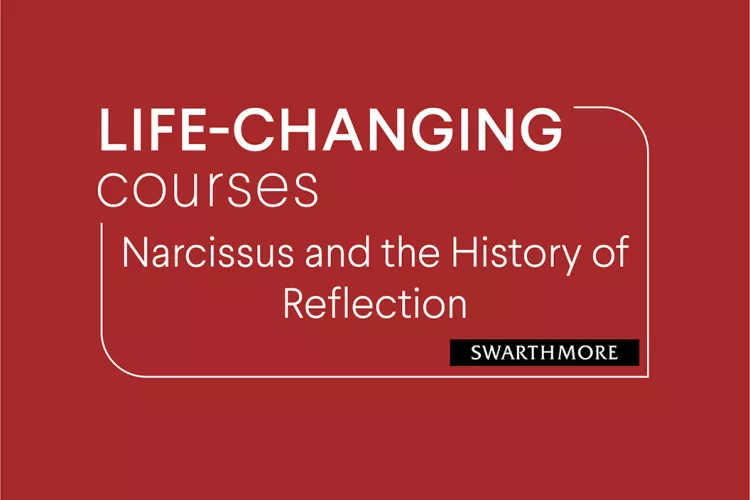Life-Changing Courses: Narcissus and the History of Reflection

This is the first profile in a series on transformative courses at the College. If you would like to nominate a course to be profiled, email news@swarthmore.edu.
Perhaps the title of Associate Professor and Chair of English Literature Eric Song’s ever-popular first-year seminar Narcissus and the History of Reflection seems like an oxymoron: We think of narcissism as a modern phenomenon. Song himself has observed this, as he says he hears far too often that a study of narcissism is fitting for first-years because “students that age, they’re so narcissistic.” Our culture — and a surprising amount of researchers — seems to believe that Instagram and Snapchat selfies are symptoms of widespread image obsession and vanity among young adults.
Song thinks those who make the comment might benefit from taking the course themselves. What his students will tell you is that, rather than reifying the casual usage of the often-hurled insult “narcissist,” Narcissus and the History of Reflection asks students to question the very lens through which they see the world, and wonder if their reflection isn’t there, too.
“The thesis of the course, for me, was that everyone is a narcissist because the way we see the world is reflected through ourselves,” says Madeleine Palden ’22, a classics major from New York, N.Y., who took the course two years ago. “I still think about what I learned in 'Narcissus' in a way that I haven’t for any other class. That idea was really important to me going through college.”
Beginning in 8 A.D. with a close look at the Latin and English version of Ovid’s Metamorphoses, the class covers more than 2,000 years of landmark literature. The syllabus skillfully draws a through line from Ovid’s telling of the death of young Narcissus, trapped by his love of his reflection, to some of the most important thinking of the 20th century, including theories on narcissism from Simone de Beauvoir’s The Second Sex and Frantz Fanon’s Black Skin, White Masks. On the way, students move through Petrarch, Spenser, and Shakespeare, thinking about the ways we inflect our own ideals into our love objects; they reflect on the monster’s struggle with his own ugliness in Mary Shelley’s Frankenstein; they analyze Dorian’s moral degradation in The Picture of Dorian Gray. These explorations fascinated Rachel Lapides ’22, who took the class in 2018.

Song will teach Narcissus and the History of Reflection again in fall 2021.
“The breadth of the material and the depth of the investigation into the literary motif of Narcissus made me confident in my choice to come to Swarthmore. It was truly unlike any class I had taken in high school,” says Lapides, an English and psychology honors major from New York, N.Y. “The class made me a better writer and a better thinker.”
Song has taught the seminar to nine classes of Swarthmore students. A 17th-century literature specialist who also teaches a course on Milton, he drew inspiration from Eve’s first postcreation reflections in Paradise Lost when he created the course for his first year of teaching at the College.
In addition to featuring classical literature, the syllabus also includes some unconventional subjects. In class, students analyze Caravaggio’s Narcissus and discuss Candyman, a supernatural horror film set in a Chicago public housing development about the ghost of a son of an enslaved man who was murdered for his relationship with a white painter’s daughter. Song’s favorite of the popular-culture additions, he says, is an episode of the early-2000s version of Queer Eye for the Straight Guy.
For a final project, students can take the class to the present day by analyzing any “literary text, media object, or cultural phenomenon” they can argue is related to narcissism or self-reflection and self-recognition. Some topics have proved favorites — Song says he received so many papers on the Disney movie Mulan and its popular song “Reflection” that he started “humbly requesting” students in his classes to choose different topics. Other papers have taken on real-time phenomena. A memorable paper from three years ago focused on descriptions of Donald Trump in Chinese-language media. Another student covered “Cat Person,” a viral New Yorker story published two weeks before the end of the finals period.
Song will teach Narcissus and the History of Reflection again in fall 2021 and has no plans to retire the course. In the future, the syllabus is likely to change as pop culture does; he plans to make use of a sequel to Candyman, written in part by Jordan Peele and directed by Nia DaCosta, that is scheduled for release in 2021.
Learn more about English Literature at Swarthmore.



